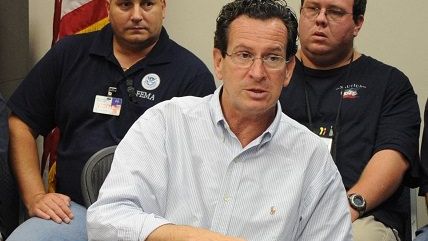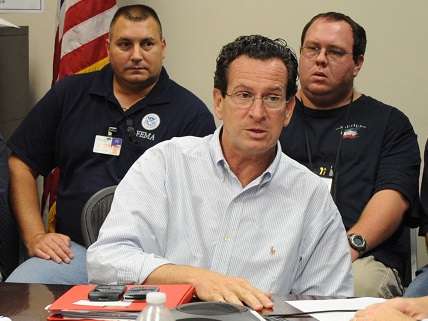Connecticut Issues Hypocritical Travel Boycott Against Indiana Over RFRA
Boycott everyone.


Connecticut Gov. Dannel Malloy announced on Twitter that he would issue an executive order later today prohibiting state-subsidized travel to Indiana. In practice, this would prevent state employees from taking trips to Indiana on the taxpayer's dime, even for official government business.
Speaking as a libertarian, I'm not exactly worked up about that. Still, Malloy's reasoning is tortured. He wrote:
Because of Indiana's new law, later today I will sign an Executive Order regarding state-funded travel.
When new laws turn back the clock on progress, we can't sit idly by. We are sending a message that discrimination won't be tolerated.
Malloy is speaking, of course, about Indiana Gov. Mike Pence's decision to sign the Religious Freedom Restoration Act, which critics believe would provide cover to Christian businesses that wish to discriminate against gay people. I wrote last week that most boycotts are hypocritical (since the boycotters inevitably fail to sanction all immoral actors), but this one is especially hypocritical: Connecticut also has an RFRA in place, albeit one with some meaningful differences.
I pointed out this hypocrisy to Malloy's office and asked for clarification on the extent of the travel ban. I received an email from one of the governor's press people informing me only that "We will have more information this afternoon."
If Connecticut is going to prohibit government-subsidized travel to RFRA states, perhaps they should respond in kind and prohibit travel to Connecticut? (A libertarian can dream, I suppose.)
All snarking aside, this refusal to engage people with different moral perspectives in exactly the kind of thing that Brian Doherty and I warned would be bad for social progress in a classically liberal cosmopolitan society.
Seattle and San Francisco have approved similar travel bans, according to The Huffington Post.
UPDATE: The Federalist's Sean Davis argues that Connecticut's RFRA is actually more expansive than Indiana's. The Indiana law prohibits the government from substantially burdening religion; Connecticut's law does not inclue the word "substantially," meaning that all government-enacted burdens on religion are illegal—in theory, at least.


Show Comments (280)